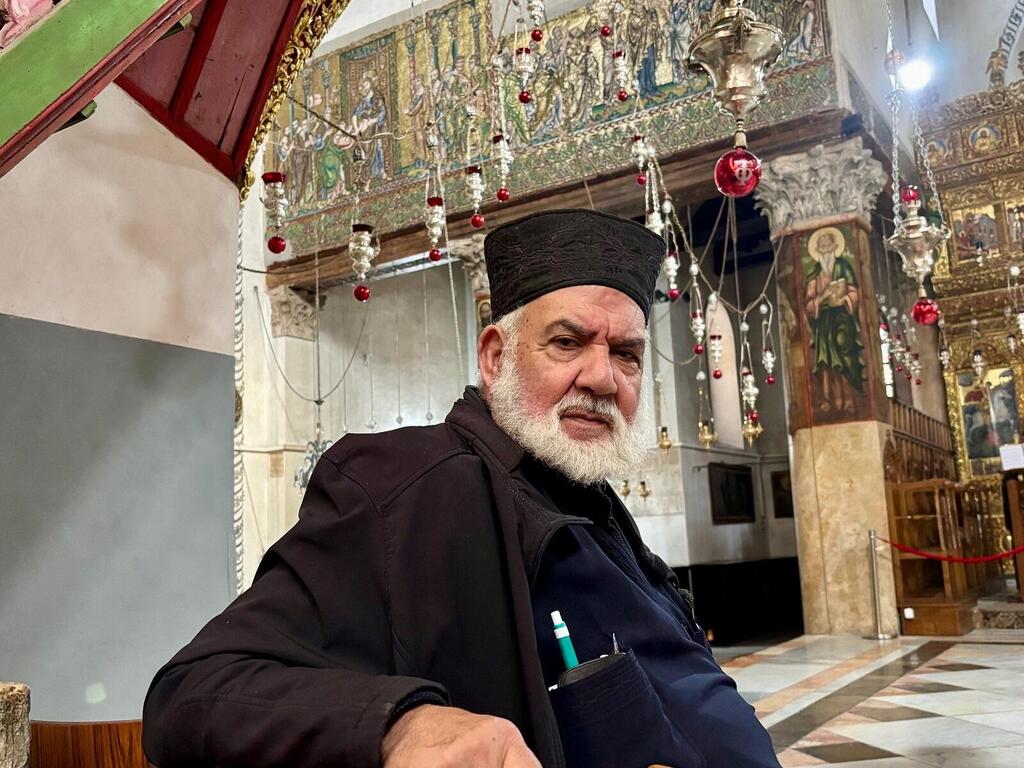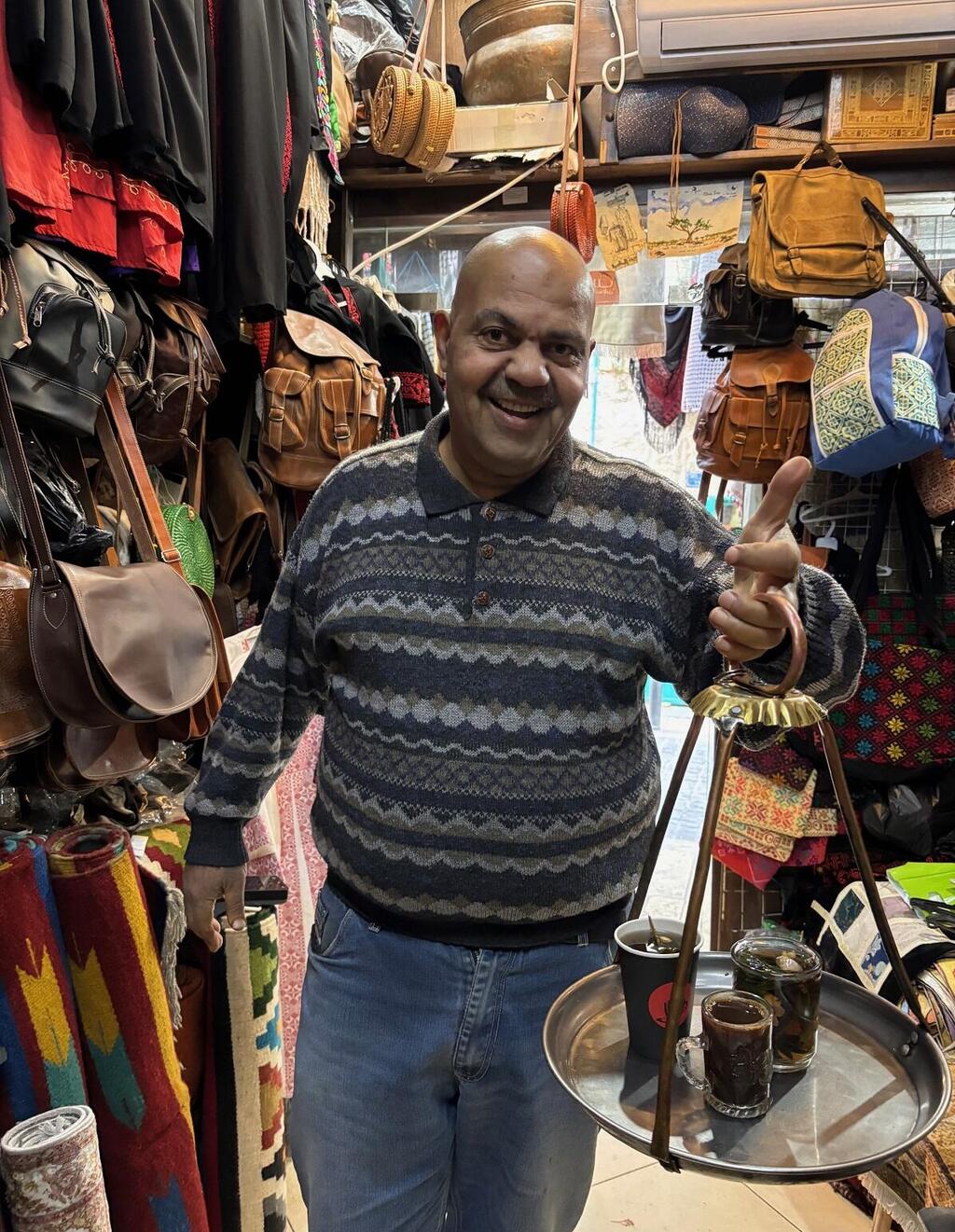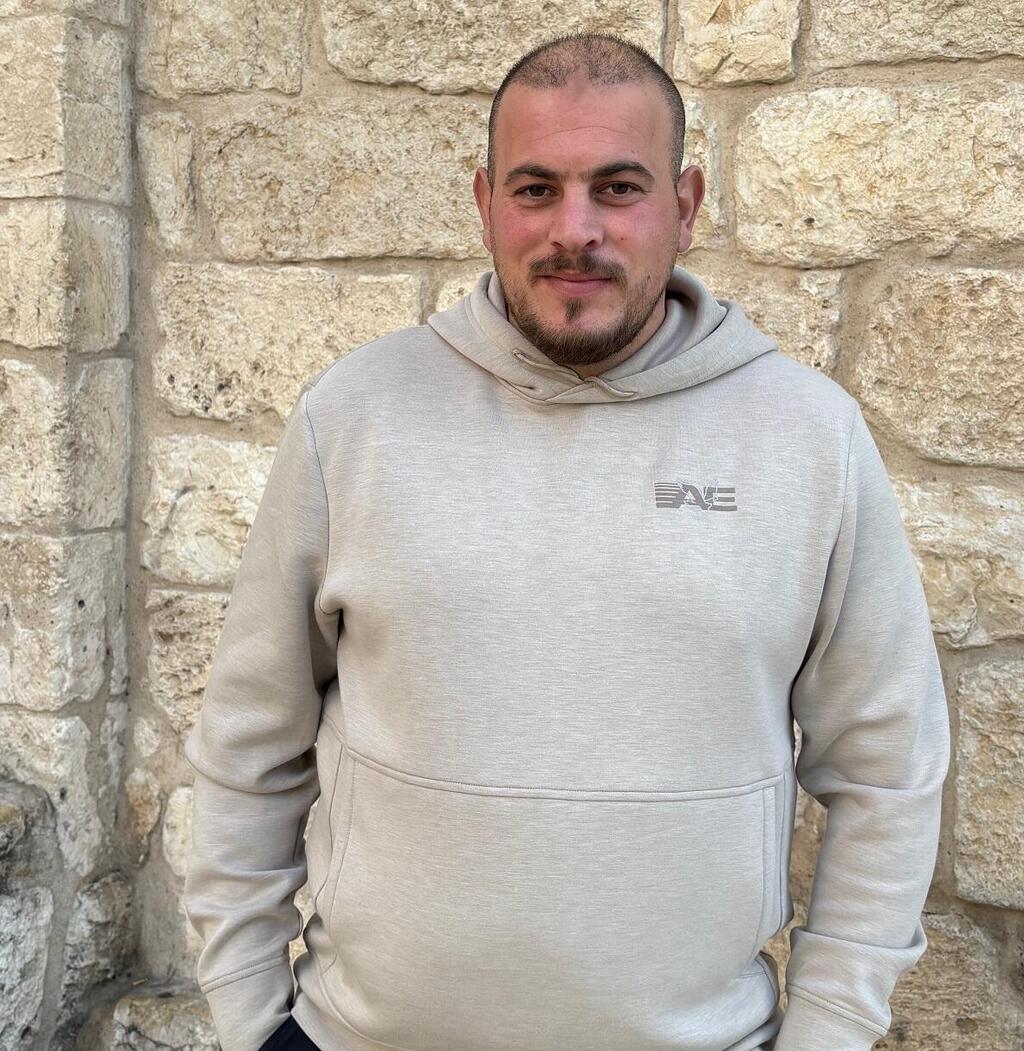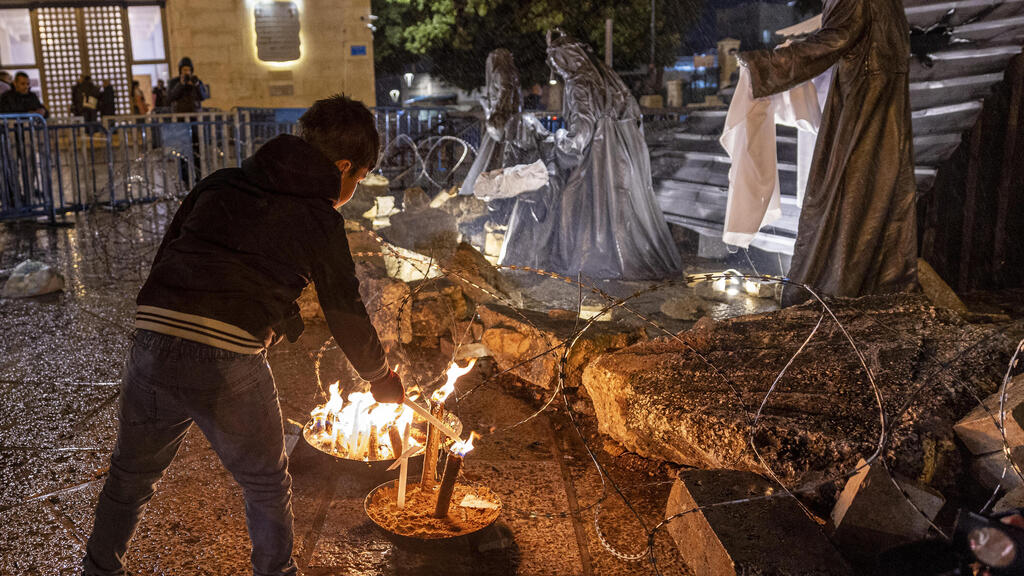Arab Christian and Muslim residents of Bethlehem are pinning their hopes on U.S. President-elect Donald Trump. They believe his inauguration could usher in a renewed era of peace for Israel and the Palestinian Authority – one that allows their communities to thrive once more.
“Trump will solve these problems,” Father Spiridon Sammour said this week. Sitting on the chancel in the Church of the Nativity in Bethlehem, the priest lamented the absence of public Christmas celebrations for the second year in a row, overshadowed by the ongoing Gaza war.
The city, once bustling with tourists, now lies empty and silent. Rocket attacks from Gaza have led to the cancellation of most international flights to Israel, leaving Bethlehem economically shattered and struggling to recover.
4 View gallery


Father Spiridon Sammour in the Church of the Nativity in Bethlehem
(Photo: Maayan Hoffman/The Media Line)
“Trump has promised to stop the war between Russia and Ukraine, and he will also stop the war between Hamas and Israel. We pray for that to be extinguished,” Sammour said.
The priest emphasized the church’s prayers for world leaders, adding: “God should let them lead people to peace. We pray for peace in the Holy Land.”
Across Manger Square, the courtyard in front of the Church of the Nativity – believed by Christians to be the birthplace of Jesus – Muslims and Christians alike expressed hope in President-elect Donald Trump. Tour guide Abood Sobha, wandering the nearly empty square searching for tourists, was eager to share his thoughts.
“Hopefully, he will help us,” Sobha said about Trump. “Trump said, ‘I want this war to end before I’m back as president.’ Hopefully, when Trump is president, he will help us stop this war and get our freedom.”
Sobha’s brother, Alan, echoed his sentiments. “I’m just praying for a cease-fire,” he said. He described Trump as a strong leader, adding: “The Middle East needs a strong leader in America. Trump speaks our language.”
Such statements are surprising, considering how many analysts have noted that Palestinians in the West Bank and Gaza tend to dislike two leaders more than any others: Trump and Israeli Prime Minister Benjamin Netanyahu.
In June, after Trump was convicted of falsifying business records related to hush money payments to adult film actress Stormy Daniels, Middle East analyst Khaled Abu Toameh said that Palestinians were “elated.”
“Their biggest fear is that [Trump] will return to power, and they don’t want him back,” Abu Toameh said at the time.
But in Bethlehem, the grim realities of 15 months of war and economic devastation have shifted some perspectives. Residents, worn down by conflict and hardship, are hungry for change.
This week, as Christmas approached, Bethlehem was eerily quiet. Once again, public celebrations were canceled. The towering Christmas tree that typically adorns Manger Square was absent, as were the lights and festivities that usually draw crowds.
Instead, Father Sammour shared somber reflections. He said that on Christmas Eve visitors from nearby West Bank communities and Israel would join His Beatitude Patriarch Cardinal Pierbattista Pizzaballa, the Latin Patriarch of Jerusalem, for midnight Mass and then leave soon after. He expected another quiet Christmas similar to last year.
“Every year, you need a special ticket to get in,” Sammour explained, recalling how thousands of Christian tourists generally flock to the Holy Land for the holiday and visit Bethlehem on Christmas Eve. “This year, it’s free because there are no tourists. There is no tree, no lights. As you see outside in the square - nothing. We hope and pray the situation will change soon.”
Sammour described the current year as even worse than the last.
“No tourists, the hotels are closed, the restaurants are closed, the shops and factories are closed. Everything is broken down. It is very sad,” he said.
When asked how residents survive, Sammour shrugged and replied, “God is big.”
4 View gallery


A Palestinian shop owner in Bethlehem, on the West Bank, serves tea and coffee; Many of the shops in Bethlehem are shuttered
(Photo: Maayan Hoffman/The Media Line)
The Church of the Nativity, built in 326 CE under the orders of Roman Emperor Constantine I and his mother, Saint Helena, has endured centuries of turmoil. Destroyed by the Samaritans in 529, it was rebuilt in 540 by Emperor Justinian. Now nearly 1,500 years old, it is one of the oldest churches in the world and the oldest in the Holy Land. Today, it is controlled by the Greek Orthodox Church, with sections also managed by Armenian Christians and Catholics.
Although many in Bethlehem claim that Muslims and Christians live in harmony, the demographics suggest otherwise.
A report published this week by the Jerusalem Center for Security and Foreign Affairs highlighted a sharp decline in the Christian population under Palestinian rule. In 1950, Christians made up 86% of Bethlehem’s population. By 2017, that figure had dwindled to just 10%.
Get the Ynetnews app on your smartphone: Google Play: https://bit.ly/4eJ37pE | Apple App Store: https://bit.ly/3ZL7iNv
Christian journalist and analyst Brian Schrauger noted that the Muslim majority has, at times, co-opted Christian narratives for political purposes. It was in Bethlehem around 10 years ago that the first baby Jesus lying on a keffiyeh was depicted – the same imagery that sparked controversy this year at a seasonal nativity scene at the Vatican, Schrauger said.
He added that Christians in the region often avoid speaking out against their Muslim neighbors.
“They don’t want to be persecuted; they want to be able to do business,” Schrauger explained.
However, many Christians are quietly leaving. “During the Second Intifada, many fled. Now they are leaving again, partly because of the war but mostly because they feel trapped – by Israel, which has barred Palestinian workers from entering since October 7, 2023, and by their Islamic neighbors.”
For those who remain, the desire for peace is unwavering.
“I want to ask just for peace,” one church visitor said. “We don’t want any more problems; we don’t want any more wars.”



